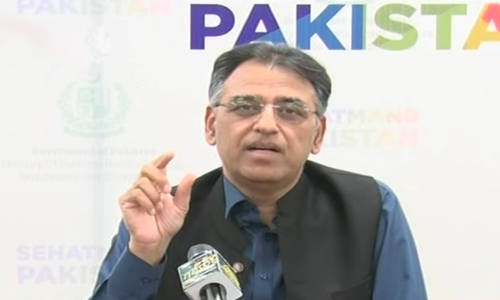Minister for Planning, Development and Special Initiatives Asad Umar announced on Tuesday that the federal government will directly provide personal protective equipment (PPEs) to approximately 400 hospitals across Pakistan as the country's battle against Covid-19 intensifies.
He made the announcement during a press conference with Special Assistant to the Prime Minister on Health Dr Zafar Mirza.
He said that healthcare in Pakistan is a devolved matter and thus it is the responsibility of the provinces to provide PPEs to frontline medics in this time of crisis. But he argued that it was a time of emergency and that the government's decision to deal with the hospitals directly while circumventing provincial authority was prudent and timely to ensure that there are no more delays in the distribution of medical equipment.
"We have identified approximately 400 hospitals across the country for this purpose. But we will prioritise 153 hospitals that have 5 or more ventilators before moving on to others," revealed Umar.
The provincial breakdown of these hospitals is as follows:
- Azad Jammu and Kashmir (AJK): 4
- Balochistan: 4
- Islamabad Capital Territory (ICT): 7
- Khyber Pakhtunkhwa: 21
- Punjab: 75
- Sindh: 42
The minister also revealed that the federal government has sent 39,500 medical kits to the provinces.
The provincial breakdown of these kits is as follows:
- Azad Jammu and Kashmir (AJK): 3,000
- Balochistan: 5,600
- Gilgit Baltistian: 1,500
- Islamabad Capital Territory (ICT): 2000
- Khyber Pakhtunkhwa: 7,600
- Punjab: 10,600
- Sindh: 9,200
He argued that testing was extremely important in country's fight against Covid-19 and thus the government was doing all it can to increase testing capacity.
"We were testing around 700 to 800 people per day weeks ago. Then we were testing around 2,000 and now can test around 3,000. So you see, our capacity is constantly increasing. Our target is to conduct 25,000 tests per day by the end of April," Umar revealed.
He once again reiterated the government's pledge to mitigate the economic fallout from the Covid-19 pandemic.
"Through our Ehsaas programme, we want to help 12 million lower-income families who have been suffering financially during this pandemic. Starting tomorrow, cheques will start going out. 4 million families will get monetary assistance at first," revealed Umar.
The minister also dispelled the notion that Pakistanis have immunity from Covid-19 and urged his countrymen to take precautions to protect themselves and others from the virus.
"Pakistanis are very self-confident and brave and that's a good thing but that doesn't mean we are somehow immune from contracting Covid-19. Any of us can contract the virus. And, those of you who are rich and think that having the services of a good doctor will protect them, let me remind you of Boris Johnson, who despite being the prime minister of a prosperous country with excellent healthcare like Britain, is in the ICU at this very moment.
If you take care of yourself, you will automatically take care of others around you," Umar reasoned.
We can flatten our virus curve by mass testing: SAPM Mirza
Special Assistant to the Prime Minister on Health Dr Zafar Mirza, meanwhile, agreed with Asad Umar that mass testing was an extremely effective way of defeating Covid-19.
"The curve of coronavirus cases can be flattened in Pakistan through mass testing," Mirza said.
He revealed that in Pakistan, 163 tests are being conducted per one million people. In comparison, 50 tests per one million are being carried out in India and 964 per million in Iran.
While he acknowledged that the figure of 163 tests per million is "not really" enough, Mirza said "all efforts are being put into increasing our testing capacity."
He also said that the government was constantly tracing contacts of those who had tested positive for the virus and revealed that his team was working on a strategy titled 'Track, Test and Quarantine' as part of the government's overall strategy to curb the spread of coronavirus in the country.














































